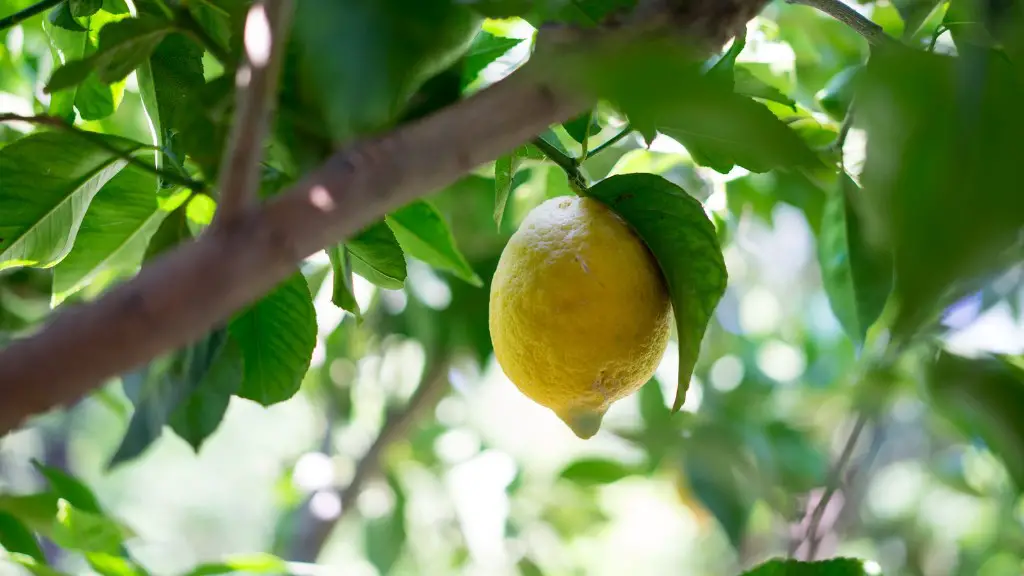When it comes to harvesting lemons from a tree, timing is key. Generally speaking, lemons should be harvested when they are at their juiciest, which happens after the fruits turn yellow. This typically happens around October to November in a subtropical climate and from March to June in a tropical climate. Harvesting before the fruit fully ripens may yield a sour fruit. However, harvesting an overly ripe lemon often renders a fruit with a softer skin and less flavor. Therefore, checking the color, feel and scent of the fruit is essential to make sure it is ready to be harvested.
It is advised to harvest the lemons earlier in the day when the fruit has cooled overnight. Late morning is the best time to pick the fruit as the sun will have started to make them sweet. The fruit should be picked while they are still slightly firm and before the stem separates from the branch. Touching the fruit with your finger should be enough to determine if it is ripe. If it gives slightly, that means it is ripe. Also, check the skin to make sure it is bright yellow. A dull yellow is an indication that the lemon is not yet ripe.
When ready, the fruit should be harvested with scissors instead of hands to avoid damaging the juicy lemon. Cut the stem about one centimeter from the branch for the best results. Avoid pulling the lemons off the tree as it may cause pain to the branch and the fruit. Also, it is wise to avoid cutting too close to the branch so as to damage the neighboring lemons that are still ripening. It is also better to pick lemons one at a time instead of harvested in bunches to avoid overripening and quick deterioration.
Lemons that have been left on the tree for an extended period of time will eventually dry out and become spotty. Therefore, it is important to keep track of which lemons should be picked first. For this reason, the exact timing of when and how often to harvest will depend on the climate and the season. In colder climates, harvesting should be done more often to ensure that the fruits don’t sit on the tree for too long.
In addition to the exact timing when to harvest, there are other considerations to take into account when harvesting lemons from a tree. Firstly, it is essential to wear gloves to protect your hands and nails from the juice of the fruit. Secondly, it is wise to not pick too many lemons at once as they are prone to spoil quickly. Thirdly, avoid piling them up on top of each other as some of them may be smushed or crushed in such manner. Lastly, use a basket or bucket to place the harvested lemons in, rather than a bag which will make them ripen faster.
Handling and Storing the Lemons
Once harvested, it is important to take the proper steps to handle and store the lemons to ensure maximum freshness and quality. Before being transferred to a storage container, the lemons should be checked for ripeness and imperfections. Lemons that are soft, have a few spots or show signs of decay should be discarded as they are more likely to spoil. Once the ripe and healthy lemons are selected, the next step is to take precautions to prevent the spread of bacteria and contamination.
For this purpose, a bucket or container with cautiously disinfected water should be used to rinse the fruits to remove dirt and dust. After washing, it should be dried with a clean cloth or paper towels. For long-term storage, wrapping the lemons in cheesecloth or wax paper helps to keep them fresh for several weeks. Another storage option is to put the lemons in a zipper-lock bag, or Tupperware in the refrigerator and consume within a week or two. Lastly, putting energy-efficient objects in the storage containers will help to maintain the temperature of the lemons.
Preserving the Lemons
Once harvested and collected, the lemons can be preserved in a variety of ways. Generally speaking, lemon juice can be stored for several days or up to one week in the refrigerator in an airtight container. It can also be frozen for up to six months. Another way of storing lemons is to preserve slices of the fruit in an airtight container with salt and water. This can be kept for up to three weeks. Another option is to put lemons in a jar with water, a lemon rind, and a few tablespoons of sugar to create a lemon syrup. This syrup can be consumed for up to three weeks.
In addition to storing lemon slices and juice, the entire fruit can also be preserved. Firstly, lemons can be preserved in a jar with grape seed oil or olive oil. Secondly, another option is to make candied lemon slices by boiling them in simple syrup and then rolling them in sugar. Lastly, dried lemon or lemon zest can be created by grating the skin of the fruit and either drying it or drying the grated zest in the oven.
Uses of the Lemon
Lemons are a versatile fruit and are used in many dishes and beverages. They can be used to make a variety of savory and sweet dishes such as lemon meringue pie, lemon ice cream, lemon curd, lemon butter sauce and smoked salmon with lemon. Lemon juice is often used as a seasoning or a garnish for salads and a variety of savory dishes including fish, chicken and vegetables. Lemons are commonly used to make lemonade, lemon-infused water and vodka, as well as to give a distinct flavor to cocktails.
In terms of medicinal uses, lemons are an excellent source of Vitamin C which help boost the immune system, protect against skin damage and reduce risk of certain illnesses such as heart disease and stroke. Additionally, lemons contain potassium and magnesium which promote healthy nerve and muscle function. They are also said to aid in digestion, reduce inflammation and improve respiratory health.
Lemons are also used in natural cleaning as they can be squeezed as a lemon juice substitute for vinegar cleaners. The acidity of lemons is effective in removing stains, soap scum and grimy build-up and it is also effective at cutting through grease and odor. Additionally, it is believed that the citrus solvent in lemons can remove mildew, mold and even termites. Lastly, lemon juice is a natural antiseptic and can be used to disinfect countertops, cutting boards and other surfaces.
Health Benefits of Lemons
Not only are lemons packed with flavor but they are also known to have a number of significant health benefits across the board. Lemons are known to contain high amounts of Vitamin C that when absorbed in the body can help to improve the immune system and fight off various illnesses. Furthermore, lemons also contain high levels of potassium, magnesium, and phosphorus which can regulate the blood pressure levels, blood sugar levels, and most importantly promote strong, healthy bones.
The flavonoid antioxidants in lemons have also been found to help protect the body against different types of cancer, as well as, inhibit the growth of harmful bacteria and fungi. Eating lemons on a regular basis can also help reduce inflammation in the body, improve digestion, skin health and even aid in weight loss. Finally, lemons can also help to purify the bloodstream and detoxify the entire body.
Conclusion
In conclusion, harvesting lemons from a tree is a time-sensitive task that requires an action plan. It is important to prepare the ideal environment and conditions for the fruits, and take the necessary steps to harvest and handle them correctly. Furthermore, knowing when to harvest and store the fruits is key. Additionally, lemons are a versatile fruit and can be used in a variety of applications, including making savory and sweet dishes, as a beverage or even natural cleaning purposes. Finally, lemons are also a great source of Vitamins and minerals and have many health benefits as well.


